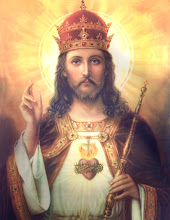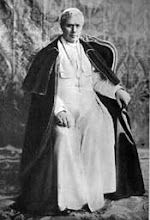
Acabei de ler “Trojan Horse in the City of God - The Catholic Crisis Explained”, de Dietrich von Hildebrand. Trata-se de um livro sensacional, no qual o seu autor manifesta em pleno toda a sua categoria de brilhante pensador e notável defensor da fé e moral católicas. Analisando as causas da crise da Igreja pós-conciliar - o livro foi publicado originalmente em 1967, mas mantém plena actualidade -, Hildebrand aponta baterias à subversão provocada no seio da mesma Igreja pela heresia progressista, a qual é por ele escalpelizada sem concessões e reduzida a pó nas suas falácias.
Pessoalmente, creio que merecem destaque, pelo génio com que Hildebrand o faz, a forma como defende a beleza (sob todos os aspectos) da tradição católica, o modo como contrapõe a santidade à filantropia humanitarista e a maneira como denuncia a “quinta coluna” de infiltrados do mundo - os falsos profetas - no interior da Igreja.
Como é óbvio, recomendo incondicionalmente a leitura deste livro, que teve em tempos uma edição em língua portuguesa no Brasil. Quem o puder fazer, que o faça!
Ora, para que os meus leitores possam aquilatar o que digo, transcrevo de seguida o trecho - com destaques meus - em que Hildebrand faz o contraponto entre a santidade e o humanitarismo, o primeiro de três do livro em causa que publicarei neste espaço.
***
For many Catholics who call themselves progressives, purely humanitarian activities and social institutions are more attractive than holiness. They have become blind to the light of Christ. Further, the ideal they have chosen is far removed from the challenge that every saint embodies. Striving for social justice - good and honorable as it is - does not presuppose that we die to ourselves, that we break the spirit of the world, that we renounce Satan and the pomp of this world. But every saint, by the resplendent fact of his holiness, shakes our consciences and calls us to renounce the world and its pomp.
The saints are an uncomfortable challenge to those who do not thirst for holiness. Because this progressive Catholics do not want their complacency disturbed, because they do not wish to be drawn out the ghetto of the “secular city”, they want to eliminate the saints. The saints bring the supernatural uncomfortably near. They confront us with the ethos of holiness and disturb those who interpret the Christian life according to their own fashion.
All those who show no interest in the existence of saints, who try to exclude the saints as much as possible from the life of the Church, only demonstrate that something is wrong with their relation to Christ. We should not forget that Church’s doctrine of justification insists on the possibility of men being fully transformed in Christ, of their becoming saints. It is here that the deepest differences between the Catholic Church and Luther’s doctrine of “sola fides” is to be found. The possibility of becoming a saint is profoundly connected with the Catholic conception of original sin, with the collaboration with grace to which every baptized person is called, with freedom of will, and many other fundamental elements of the deposit of Catholic faith. If a man is nor concerned about this central point of Catholic doctrine, he exhibits a serious symptom of the loss of genuine faith.
Dietrich von Hildebrand, in “Trojan Horse in the City of God”, Manchester, New Hampshire, Sophia Institute Press, 1993 - páginas 258 e 259.
Pessoalmente, creio que merecem destaque, pelo génio com que Hildebrand o faz, a forma como defende a beleza (sob todos os aspectos) da tradição católica, o modo como contrapõe a santidade à filantropia humanitarista e a maneira como denuncia a “quinta coluna” de infiltrados do mundo - os falsos profetas - no interior da Igreja.
Como é óbvio, recomendo incondicionalmente a leitura deste livro, que teve em tempos uma edição em língua portuguesa no Brasil. Quem o puder fazer, que o faça!
Ora, para que os meus leitores possam aquilatar o que digo, transcrevo de seguida o trecho - com destaques meus - em que Hildebrand faz o contraponto entre a santidade e o humanitarismo, o primeiro de três do livro em causa que publicarei neste espaço.
***
For many Catholics who call themselves progressives, purely humanitarian activities and social institutions are more attractive than holiness. They have become blind to the light of Christ. Further, the ideal they have chosen is far removed from the challenge that every saint embodies. Striving for social justice - good and honorable as it is - does not presuppose that we die to ourselves, that we break the spirit of the world, that we renounce Satan and the pomp of this world. But every saint, by the resplendent fact of his holiness, shakes our consciences and calls us to renounce the world and its pomp.
The saints are an uncomfortable challenge to those who do not thirst for holiness. Because this progressive Catholics do not want their complacency disturbed, because they do not wish to be drawn out the ghetto of the “secular city”, they want to eliminate the saints. The saints bring the supernatural uncomfortably near. They confront us with the ethos of holiness and disturb those who interpret the Christian life according to their own fashion.
All those who show no interest in the existence of saints, who try to exclude the saints as much as possible from the life of the Church, only demonstrate that something is wrong with their relation to Christ. We should not forget that Church’s doctrine of justification insists on the possibility of men being fully transformed in Christ, of their becoming saints. It is here that the deepest differences between the Catholic Church and Luther’s doctrine of “sola fides” is to be found. The possibility of becoming a saint is profoundly connected with the Catholic conception of original sin, with the collaboration with grace to which every baptized person is called, with freedom of will, and many other fundamental elements of the deposit of Catholic faith. If a man is nor concerned about this central point of Catholic doctrine, he exhibits a serious symptom of the loss of genuine faith.
Dietrich von Hildebrand, in “Trojan Horse in the City of God”, Manchester, New Hampshire, Sophia Institute Press, 1993 - páginas 258 e 259.
















1 comentários:
De fato, uma observação profética e contundente contra uma perigosa mentalidade eclesial.
Enviar um comentário